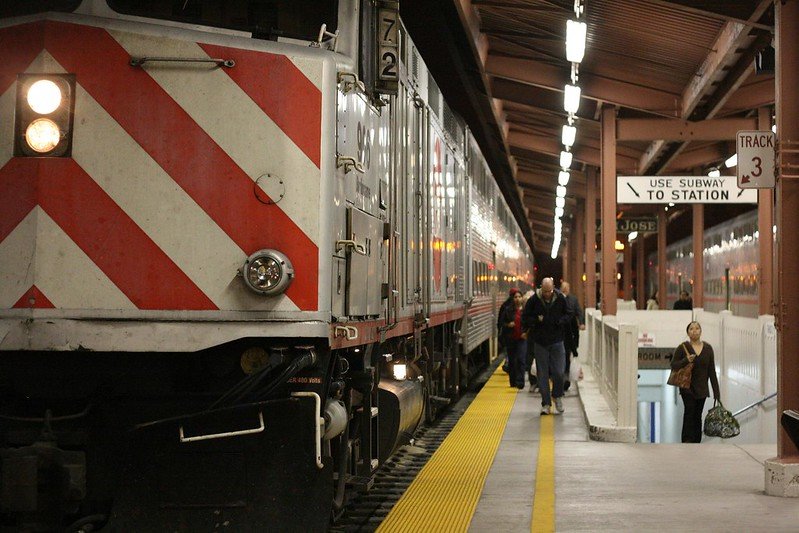UC Berkeley's Institute of Governmental Studies (IGS) analyzes recent data showing that 53% of State voters would still give Prop 13 the stamp of approval today—and this majority preference is seen across all party, political, sex, age, and racial subgroups (with the sole exception of “very liberal” Californians). Meanwhile, SJ's elected representatives enthusiastically campaign for anti-Prop 13 measures ACA 1 & 13, and near-unanimously oppose the Taxpayer Protection and Gov't Accountability Act.
Read MoreThe Caltrain HSR Compatibility Blog team explains that parking out-of-service trains in busy transportation hubs such as Diridon Station—though a common practice for SJ—is counter-intuitive, incurring extra costs while sacrificing speed and efficiency. Below, dig into the first part of an informative series about fixing public transportation, in and beyond the Bay Area.
Read MoreDave Rand, local land use attorney specializing in CEQA regulations, exclusively chats with Opp Now about all things California Environmental Quality Act. He analyzes why it first came into being, what loophole encourages cities/interest groups to logjam projects—as well as new reforms to mitigate this—and his suggested solution (warning, it's pretty “surgical”). Plus: how do carpenters' unions fit into the puzzle of ridiculous CEQA overrregulations, even for exemption options?
Read MoreSJ's Citizens for Fiscal Responsibility and Silicon Valley Leadership Group chime in on Senator Cortese's controversial bill to jack up our sales tax from its existing cap of 2%. Rather than worsen residents' fiscal burden, they point out, shouldn't San Jose look into balancing its budget better and cutting the fluff? Or is that too radical a concept? An Opp Now exclusive.
Read MoreLocal taxpayer advocate Chris Robell writes in the San Mateo Daily Journal that amidst Redwood City Council's incessant pleas for more taxpayer money (yep, they're hoping to raise the sales tax again today), a comically simple yet overlooked solution remains: be smarter about City spending. Robell analyzes some recently approved Deadwood City expenditures, and—spoiler alert—they get a bit ridiculous.
Read MorePractically speaking, transforming empty offices into apartments is not a simple task; local developers are paying through the nose to complete projects in areas like Downtown SJ. On top of that, add tax and regulatory barriers like CEQA and stringent zoning codes. NPR's Erin Kenney says that to incentivize sustainable construction, jurisdictions should consider zoning/tax allowances.
Read MoreCPC's Edward Ring recently analyzed for Opp Now that San Jose's Housing First methodology doesn't alleviate homelessness, but creates “highly unsafe,” gov't-dependent communities. The LA Times chimes in, breaking down how LA's Mayfair hotel was trashed—and neighboring residents endangered—when converted to accountability-free homeless housing.
Read MoreA forest walk at twilight. Amber storefront lights. A rare find in a curio shop. Piano keys. Peter Coe Verbica muses on navigating what is lost, what is found, as we kick off our Holiday Season. An Opp Now exclusive.
Read MoreIn his exclusive report for Opportunity Now, Randal O'Toole of the Thoreau Institute explores how New Urbanist thinking and misguided anti-market policies created one of the most unaffordable housing markets in the world—and how to fix it. First posted on 11.19.2020.
Read MoreRandal O'Toole of the Thoreau Institutes outlines how to start undoing the failed policies of the past that led to Santa Clara County's current affordability debacle, with an eye toward increasing tax revenues as well. Originally published in November of 2020, O'Toole's sharp analysis—and conclusions for urban-growth boundaries and CEQA—is more relevant than ever today. An Opp Now exclusive.
Read MoreThe State's HSR project—voter-approved in 2008 and today, billions of dollars later, still without a single actual track to its name—has proven a masterclass in suspense (whether you call it a slow burn or, along with transit experts, a wildly overbudgeted crash and burn). The Cato Institute points out that once built and operated, CA HSR will inefficiently and excessively waste energy (compared to airplanes and conventional trains) and raise GHG emissions significantly.
Read MoreNext Wednesday, a new ad hoc committee overseeing the BART Downtown San Jose extension will meet for the first time. In preparation, Bay Area Transportation Working Group (BATWG) members have compiled a list of key questions for the steering committee to address. BATWG's letter, in its entirety, follows.
Read More











